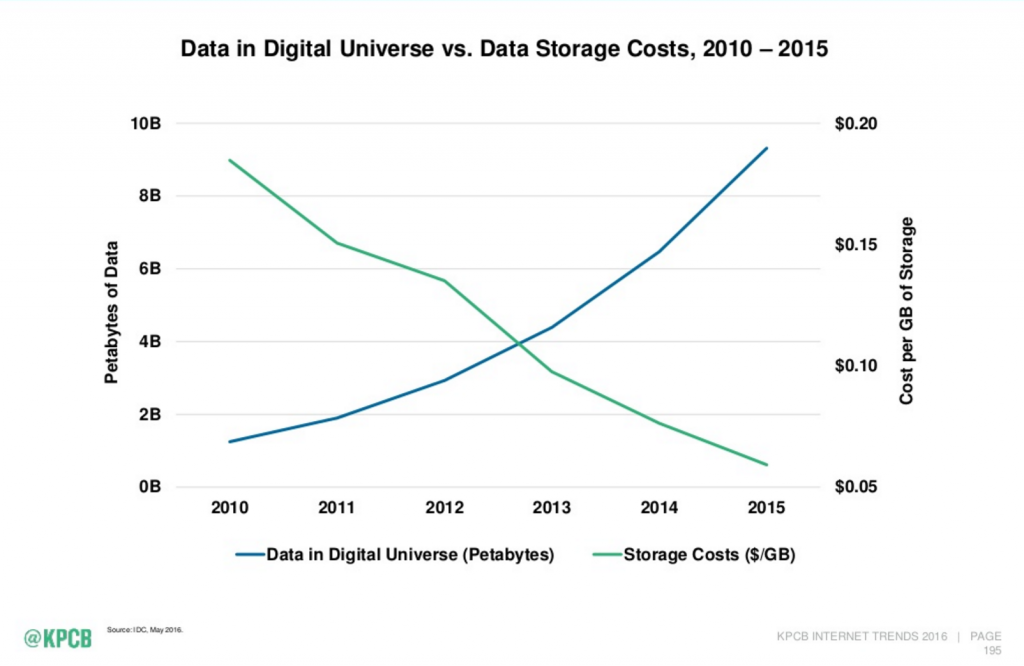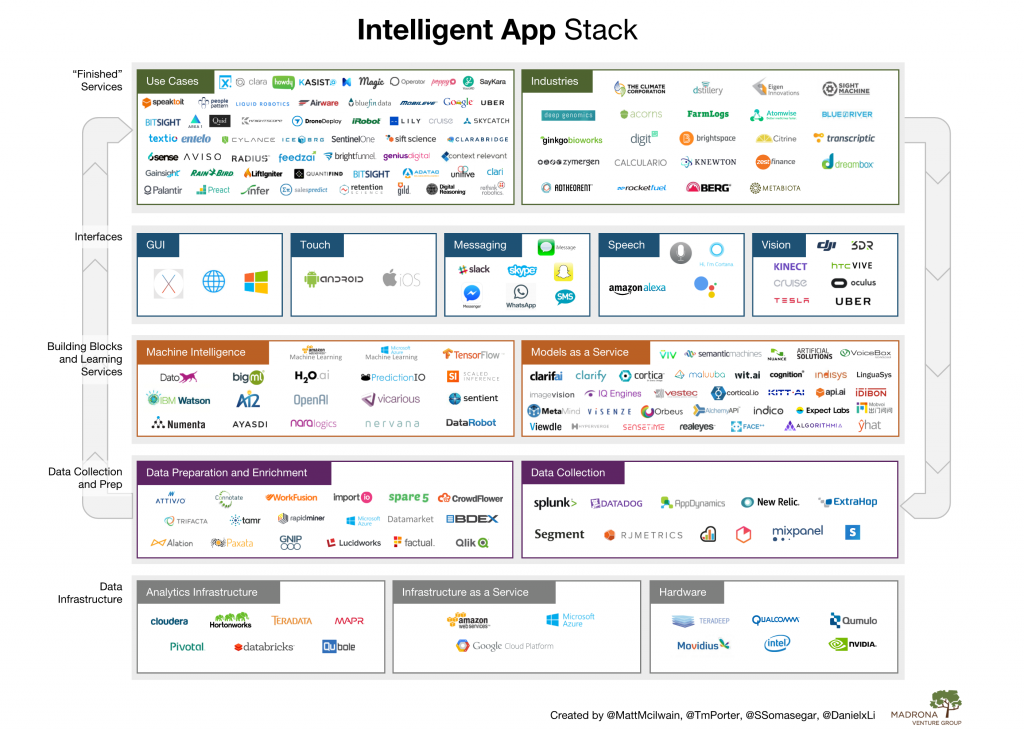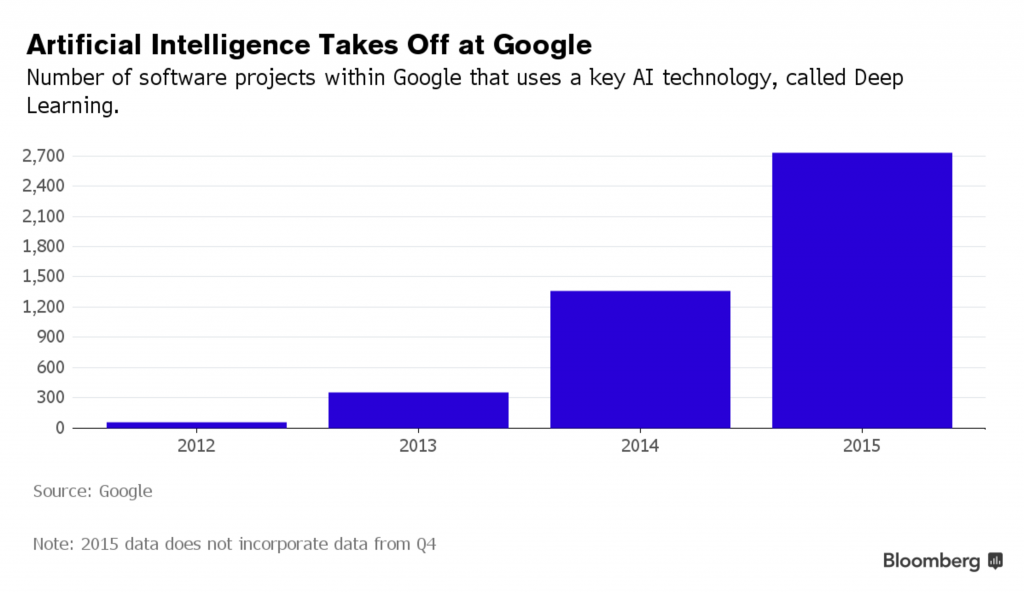Every company is now a data company, capable of using machine learning in the cloud to deploy intelligent apps at scale, thanks to three machine learning trends: data flywheels, the algorithm economy, and cloud-hosted intelligence.
That was the takeaway from the inaugural Machine Learning / Artificial Intelligence Summit, hosted by Madrona Venture Group* last month in Seattle, where more than 100 experts, researchers, and journalists converged to discuss the future of artificial intelligence, trends in machine learning, and how to build smarter applications.
With hosted machine learning models, companies can now quickly analyze large, complex data, and deliver faster, more accurate insights without the high cost of deploying and maintaining machine learning systems.
“Every successful new application built today will be an intelligent application,” Soma Somasegar said, venture partner at Madrona Venture Group. “Intelligent building blocks and learning services will be the brains behind apps.”
Below is an overview of the three machine learning trends leading to a new paradigm where every app has the potential to be a smart app.
Data Flywheels
Digital data and cloud storage follow Moore’s law: the world’s data doubles every two years, while the cost of storing that data declines at roughly the same rate. This abundance of data enables more features, and better machine learning models to be created.
“In the world of intelligent applications, data will be king, and the services that can generate the highest-quality data will have an unfair advantage from their data flywheel — more data leading to better models, leading to a better user experience, leading to more users, leading to more data,” Somasegar says.
For instance, Tesla has collected 780 million miles of driving data, and they’re adding another million every 10 hours.
This data is feed into Autopilot, their assisted driving program that uses ultrasonic sensors, radar, and cameras to steer, change lanes, and avoid collisions with little human interaction. Ultimately, this data will be the basis for their autonomous, self-driving car theyplan to release in 2018.
Compared to Google’s self-driving program, which has amassed just over 1.5 million miles of driving data. Tesla’s data flywheel is in full effect.
The Algorithm Economy
All the data in the world isn’t very useful if you can’t leverage it. Algorithms are how you efficiently scale the manual management of business processes.
“Everything at scale in this world is going to be managed by algorithms and data,” says Joseph Sirosh, CVP of Data Group and Machine Learning at Microsoft. In the near-future, “every business is an algorithmic business.”
This creates an algorithm economy, where algorithm marketplaces function as the global meeting place for researchers, engineers, and organizations to create, share, and remix algorithmic intelligence at scale. As composable building blocks, algorithms can be stacked together to manipulate data, and extract key insights.
In the algorithm economy, state-of-the-art research is turned into functional, running code, and made available for others to use. The intelligent app stack illustrates the abstraction layers, which form the building blocks needed to create intelligent apps.
“Algorithm marketplaces are similar to the mobile app stores that created the ‘app economy,'” Alexander Linden, research director at Gartner said. “The essence of the app economy is to allow all kinds of individuals to distribute and sell software globally without the need to pitch their idea to investors or set up their own sales, marketing and distribution channels.”
Cloud-Hosted Intelligence
For a company to discover insights about their business, using algorithmic machine intelligence to iteratively learn from their data is the only scalable way. It’s historically been an expensive upfront investment with no guarantee of a significant return.
“Analytics and data science today are like tailoring 40-years ago,” Sirosh said. “It takes a long time and a tremendous amount of effort.”
For instance, an organization needs to first collect custom data, hire a team of data scientists, continually develop the models, and optimize them to keep pace with the rapidly changing and growing volumes of data — that’s just to get started.
With more data becoming available, and the cost to store it dropping, machine learning is starting to move to the cloud, where a scalable web service is an API call away. Data scientists will no longer need to manage infrastructure or implement custom code. The systems will scale for them, generating new models on the fly, and delivering faster, more accurate results.
“When the effort to build and deploy machine learning models becomes a lot less — when you can ‘mass manufacture’ it — then the data to do that becomes widely available in the cloud,” Sirosh said.
Emerging machine intelligence platforms hosting pre-trained machine learning models-as-a-service will make it easy for companies to get started with ML, allowing them to rapidly take their applications from prototype to production.
“As companies adopt the microservices development paradigm, the ability to plug and play different machine learning models and services to deliver specific functionality becomes more and more interesting,” Somasegar said.
When open source machine learning and deep learning frameworks running in the cloud, like Scikit-Learn, NLTK, Numpy, Caffe, TensorFlow, Theano, or Torch, companies will be able to easily leverage pre-trained, hosted models to tag images, recommend products, and do general natural language processing tasks.
Recap of Machine Learning Trends
“Our world view is that every company today is a data company, and every application is an intelligent application,” Somasegar said. “How can companies get insights from huge amounts of data and learn from that? That’s something that has to be brought up with every organization in the world.”
As the data flywheels begin to turn, the cost to acquire, store, and compute that data will continue to drop.
This creates an algorithm economy, where the building blocks of machine intelligence live in the cloud. These pre-trained, hosted machine learning models make it possible for every app to tap into algorithmic intelligence at scale.
The confluence of data flywheels, the algorithm economy, and cloud-hosted intelligence means:
- Every company can now be a data company
- Every company can now access algorithmic intelligence
- Every app can now be an intelligent app
“We have come a long way,” Matt McIlwain says, Madrona Venture Group managing director. “But we still have a long way to go.”
*Disclosure: Madrona Venture Group is an investor in Algorithmia
Bio: Matt Kiser is the product marketing manager at Algorithmia, were he helps developers give their apps super powers.





 雷达卡
雷达卡



















 提升卡
提升卡 置顶卡
置顶卡 沉默卡
沉默卡 变色卡
变色卡 抢沙发
抢沙发 千斤顶
千斤顶 显身卡
显身卡





 京公网安备 11010802022788号
京公网安备 11010802022788号







